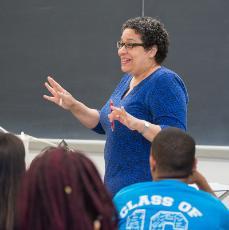A Priority in the Classroom
By the late 1960s, colleges and universities across the country began creating African-American Studies programs. Beginning in the 1971-72 academic year, Muhlenberg offered an Afro-American seminar and various special topics courses in minority cultures.
 In the 1980s, Muhlenberg faculty, including Daniel Wilson (pictured, left), professor of history began to push for an expansion of the curriculum to include a specific focus on the history of people of color. By 1987, African-American History had become a regular offering in the History Department, and African-American Studies became an official history concentration in 1991.
In the 1980s, Muhlenberg faculty, including Daniel Wilson (pictured, left), professor of history began to push for an expansion of the curriculum to include a specific focus on the history of people of color. By 1987, African-American History had become a regular offering in the History Department, and African-American Studies became an official history concentration in 1991.
Over the years, what began as a series of special topics courses in the history department expanded into multiple disciplines as the College began to promote an exploration of the black experience as a distinct discipline, rather than as a subset of the traditional academic understanding of American history.
In 2007, Muhlenberg faculty approved an Africana Studiesprogram with a new tenure-track position dedicated to Africana Studies and a related discipline. The program joined existing academic majors, minors and programs in Asian Traditions, International Studies, Jewish Studies, Latin American & Caribbean Studies and Women's Studies.
 Today Roberta Meek (pictured, right), lecturer of history and media & communication, serves as director of the Africana Studies program at Muhlenberg. The Africana Studies program is committed to an interdisciplinary inquiry into the actions, events and phenomena that structure the historical and contemporary life experiences of people of African descent living on the African continent and in Black Atlantic societies including the United States, the Caribbean and Latin America.
Today Roberta Meek (pictured, right), lecturer of history and media & communication, serves as director of the Africana Studies program at Muhlenberg. The Africana Studies program is committed to an interdisciplinary inquiry into the actions, events and phenomena that structure the historical and contemporary life experiences of people of African descent living on the African continent and in Black Atlantic societies including the United States, the Caribbean and Latin America.
